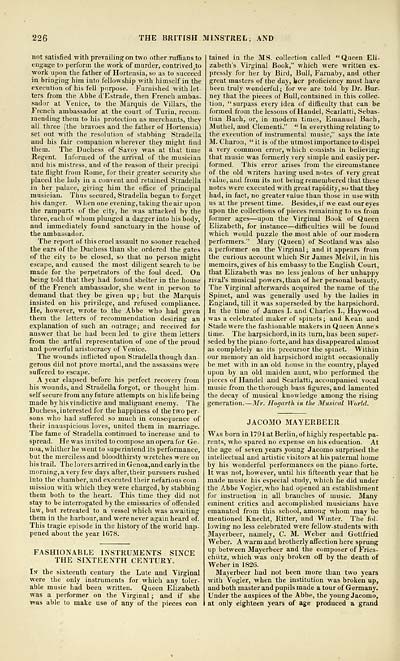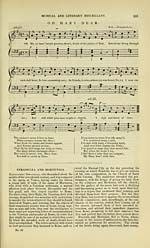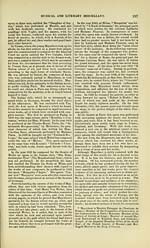Glen Collection of printed music > Printed music > British minstrel, and musical and literary miscellany
(234) Page 226
Download files
Complete book:
Individual page:
Thumbnail gallery: Grid view | List view

226
THE BRITISH MINSTREL: AND
not satisfied with prevailing on two other ruffians to
engage to perform the work of murder, contrived _to
work upon the father of Hortensia, so as to succeed
in bringing him into fellowship with himself in the
execution of his fell purpose. Furnished with let-
ters from the Abbe d'Estrade, then French ambas-
sador at Venice, to the Marquis de Villars, the
French ambassador at the court of Turin, recom.
mending them to his protection as merchants, they
all three (the bravoes and the father of Hortensia)
set out with the resolution of stabbing Stradella
and his fair companion wherever they might find
them. The Duchess of Savoy was at that time
Regent. Informed of the arrival of the musician
and his mistress, and of the reason of their precipi-
tate flight from Rome, for their greater security she
placed the lady in a convent and retained Stradella
in her palace, giving him the office of principal
musician. Thus secured, Stradella began to forget
his danger. When one evening, taking the air upon
the ramparts of the city, he was attacked by the
three, each of whom plunged a dagger into his body,
and immediately found sanctuary in the house of
the ambassador.
The report of this cruel assault no sooner reached
the ears of the Duchess than she ordered the gates
of the city to be closed, so that no person might
escape, and caused the most diligent search to be
made for the perpetrators of the foul deed. On
b«ing told that they had found shelter in the house
of the French ambassador, she went in person to
demand that they be given up; but the Marquis
insisted on his privilege, and refused compliance.
He, however, wrote to the Abbe who had given
them the letters of recommendation desiring an
explanation of such an outrage; and received for
answer that he had been led to give them letters
from the artful representation of one of the proud
and powerful aristocracy of Venice.
The wounds inflicted upon Stradella though dan-
gerous did not prove mortal, and the assassins were
suffered to escape.
A year elapsed before his perfect recovery from
his wounds, and Stradella forgot, or thought him-
self secure from any future attempts on his life being
made by his vindictive and malignant enemy. The
Duchess, interested for the happiness ol the two per-
sons who had suffered so much in consequence of
their inauspicious loves, united them in marriage.
The fame of Stradella continued to increase and to
spread. He was invited to compose an opera for Ge-
noa, whither he went to superintend its performance,
but the merciless and bloodthirsty wretches were on
his trail. The lovers arrived in Genoa, and early in the
morning, a very few days after, their pursuers rushed
into the chamber, and executed their nefarious com -
mission with which they were charged, by stabbing
them both to the heart. This time they did not
stay to be interrogated by the emissaries of offended
law, but retreated to a vessel which was awaiting
them in the harbour, and were never again heard of.
This tragic episode in the history of the world hap-
pened about the year 1678.
FASHIONABLE INSTRUMENTS SINCE
THE SIXTEENTH CENTURY.
In the sixteenth century the Lute and Virginal
were the only instruments for which any toler-
able music had been written. Queen Elizabeth
was a performer on the Virginal ; and if she
was able to make use of any of the pieces con
tained in the MS. collection called " Queen Eli-
zabeth's Virginal Book," which were written ex-
pressly for her by Bird, Bull, Farnaby, and other
great masters of the day, ker proficiency must have
been truly wonderful; for we are told by Dr. Bur.
ney that the pieces of Bull, contained in this collec-
tion, " surpass every idea of difficulty that can be
formed from the lessons of Handel, Scarlatti, Sebas-
tian Bach, or, in modern times, Emanuel Bach,
Mulhcl, and Clementi." " In everything relating to
the execution of instrumental music," says the late
M. Charon, "it is of the utmost importance to dispel
a very common error, which consists in believing
that music was formerly very simple and easily per-
formed. This error arises from the circumstance
of the old writers having used notes of very great
value, and from its not being remembered that these
notes were executed with great rapidity, so that they
had, in fact, no greater value than those in use witti
us at the present time. Besides, if we cast our eyes
upon the collections of pieces remaining to us from
former ages — upon the Virginal Book of Queen
Elizabeth, for instance — difficulties will be found
which would puzzle the most able of our modern
performers." Mary (Queen) of Scotland was also
a performer on the Virginal ; and it appears from
the curious account which Sir James Melvil, in liis
memoirs, gives of his embassy to the English Court,
that Elizabeth was no less jealous of her unhappy
rival's musical powers, than of her personal beauty.
The Virginal afterwards acquired the name of the
Spinet, and was generally used by the ladies in
England, till it was superseded by the harpsichord.
In the time of James I. and Charles I., Haywood
was a celebrated maker of spinets; and Kean and
Stade were the fashionable makers in Queen Anne's
time. The harpsichord, in its turn, has been super-
seded by the pianoforte, and has disappeared almost
as completely as its precursor the spinet. Within
our memory an old harpsichord might occasionally
be met with in an old house in the country, plajed
upon by an old maiden aunt, who performed the
pieces of Handel and Scarlatti, accompanied vocal
music from the thorough bass figures, and lamented
the decay of musical knowledge among the rising
generation. — Mr. HogartJi in the Musical World.
JACOMO MAYERBEER
Was born in 1794 at Berlin, of highly respectable pa-
rents, who spared no expense on his education. At
the age of seven years young Jacomo surprised the
intellectual and artistic visitors at his paternal home
by his wonderful performances on the piano-forte.
It was not, however, until his fifteenth year that he
made music his especial study, which he did under
the Abbe Vogler, who had opened an establishment
for instruction in all branches of music. Many
eminent critics and accomplished musicians have
emanated from this school, among whom may be
mentioned Knecht, Ritter, and Winter. The fol-
lowing no less celebrated were fellow-students with
Mayerbeer, namely, C. M. Weber and Gottfried
Weber. A warm and brotherly affection here sprung
up between Mayerbeer and the composer of Fries-
chiitz, which was only broken off by the death of
Weber in 1826.
Mayerbeer had not been more than two years
with Vogler, when the institution was broken up,
and both master and pupils made a tour of Germany.
Under the auspices of the Abbe, the young Jacomo,
at only eighteen years of age produced a grand
THE BRITISH MINSTREL: AND
not satisfied with prevailing on two other ruffians to
engage to perform the work of murder, contrived _to
work upon the father of Hortensia, so as to succeed
in bringing him into fellowship with himself in the
execution of his fell purpose. Furnished with let-
ters from the Abbe d'Estrade, then French ambas-
sador at Venice, to the Marquis de Villars, the
French ambassador at the court of Turin, recom.
mending them to his protection as merchants, they
all three (the bravoes and the father of Hortensia)
set out with the resolution of stabbing Stradella
and his fair companion wherever they might find
them. The Duchess of Savoy was at that time
Regent. Informed of the arrival of the musician
and his mistress, and of the reason of their precipi-
tate flight from Rome, for their greater security she
placed the lady in a convent and retained Stradella
in her palace, giving him the office of principal
musician. Thus secured, Stradella began to forget
his danger. When one evening, taking the air upon
the ramparts of the city, he was attacked by the
three, each of whom plunged a dagger into his body,
and immediately found sanctuary in the house of
the ambassador.
The report of this cruel assault no sooner reached
the ears of the Duchess than she ordered the gates
of the city to be closed, so that no person might
escape, and caused the most diligent search to be
made for the perpetrators of the foul deed. On
b«ing told that they had found shelter in the house
of the French ambassador, she went in person to
demand that they be given up; but the Marquis
insisted on his privilege, and refused compliance.
He, however, wrote to the Abbe who had given
them the letters of recommendation desiring an
explanation of such an outrage; and received for
answer that he had been led to give them letters
from the artful representation of one of the proud
and powerful aristocracy of Venice.
The wounds inflicted upon Stradella though dan-
gerous did not prove mortal, and the assassins were
suffered to escape.
A year elapsed before his perfect recovery from
his wounds, and Stradella forgot, or thought him-
self secure from any future attempts on his life being
made by his vindictive and malignant enemy. The
Duchess, interested for the happiness ol the two per-
sons who had suffered so much in consequence of
their inauspicious loves, united them in marriage.
The fame of Stradella continued to increase and to
spread. He was invited to compose an opera for Ge-
noa, whither he went to superintend its performance,
but the merciless and bloodthirsty wretches were on
his trail. The lovers arrived in Genoa, and early in the
morning, a very few days after, their pursuers rushed
into the chamber, and executed their nefarious com -
mission with which they were charged, by stabbing
them both to the heart. This time they did not
stay to be interrogated by the emissaries of offended
law, but retreated to a vessel which was awaiting
them in the harbour, and were never again heard of.
This tragic episode in the history of the world hap-
pened about the year 1678.
FASHIONABLE INSTRUMENTS SINCE
THE SIXTEENTH CENTURY.
In the sixteenth century the Lute and Virginal
were the only instruments for which any toler-
able music had been written. Queen Elizabeth
was a performer on the Virginal ; and if she
was able to make use of any of the pieces con
tained in the MS. collection called " Queen Eli-
zabeth's Virginal Book," which were written ex-
pressly for her by Bird, Bull, Farnaby, and other
great masters of the day, ker proficiency must have
been truly wonderful; for we are told by Dr. Bur.
ney that the pieces of Bull, contained in this collec-
tion, " surpass every idea of difficulty that can be
formed from the lessons of Handel, Scarlatti, Sebas-
tian Bach, or, in modern times, Emanuel Bach,
Mulhcl, and Clementi." " In everything relating to
the execution of instrumental music," says the late
M. Charon, "it is of the utmost importance to dispel
a very common error, which consists in believing
that music was formerly very simple and easily per-
formed. This error arises from the circumstance
of the old writers having used notes of very great
value, and from its not being remembered that these
notes were executed with great rapidity, so that they
had, in fact, no greater value than those in use witti
us at the present time. Besides, if we cast our eyes
upon the collections of pieces remaining to us from
former ages — upon the Virginal Book of Queen
Elizabeth, for instance — difficulties will be found
which would puzzle the most able of our modern
performers." Mary (Queen) of Scotland was also
a performer on the Virginal ; and it appears from
the curious account which Sir James Melvil, in liis
memoirs, gives of his embassy to the English Court,
that Elizabeth was no less jealous of her unhappy
rival's musical powers, than of her personal beauty.
The Virginal afterwards acquired the name of the
Spinet, and was generally used by the ladies in
England, till it was superseded by the harpsichord.
In the time of James I. and Charles I., Haywood
was a celebrated maker of spinets; and Kean and
Stade were the fashionable makers in Queen Anne's
time. The harpsichord, in its turn, has been super-
seded by the pianoforte, and has disappeared almost
as completely as its precursor the spinet. Within
our memory an old harpsichord might occasionally
be met with in an old house in the country, plajed
upon by an old maiden aunt, who performed the
pieces of Handel and Scarlatti, accompanied vocal
music from the thorough bass figures, and lamented
the decay of musical knowledge among the rising
generation. — Mr. HogartJi in the Musical World.
JACOMO MAYERBEER
Was born in 1794 at Berlin, of highly respectable pa-
rents, who spared no expense on his education. At
the age of seven years young Jacomo surprised the
intellectual and artistic visitors at his paternal home
by his wonderful performances on the piano-forte.
It was not, however, until his fifteenth year that he
made music his especial study, which he did under
the Abbe Vogler, who had opened an establishment
for instruction in all branches of music. Many
eminent critics and accomplished musicians have
emanated from this school, among whom may be
mentioned Knecht, Ritter, and Winter. The fol-
lowing no less celebrated were fellow-students with
Mayerbeer, namely, C. M. Weber and Gottfried
Weber. A warm and brotherly affection here sprung
up between Mayerbeer and the composer of Fries-
chiitz, which was only broken off by the death of
Weber in 1826.
Mayerbeer had not been more than two years
with Vogler, when the institution was broken up,
and both master and pupils made a tour of Germany.
Under the auspices of the Abbe, the young Jacomo,
at only eighteen years of age produced a grand
Set display mode to: Large image | Transcription
Images and transcriptions on this page, including medium image downloads, may be used under the Creative Commons Attribution 4.0 International Licence unless otherwise stated. ![]()
| Special collections of printed music > Glen Collection of printed music > Printed music > British minstrel, and musical and literary miscellany > (234) Page 226 |
|---|
| Permanent URL | https://digital.nls.uk/91437753 |
|---|
| Description | Scottish songs and music of the 18th and early 19th centuries, including music for the Highland bagpipe. These are selected items from the collection of John Glen (1833 to 1904). Also includes a few manuscripts, some treatises, and other books on the subject. |
|---|
| Description | The Glen Collection and the Inglis Collection represent mainly 18th and 19th century Scottish music, including Scottish songs. The collections of Berlioz and Verdi collected by bibliographer Cecil Hopkinson contain contemporary and later editions of the works of the two composers Berlioz and Verdi. |
|---|

